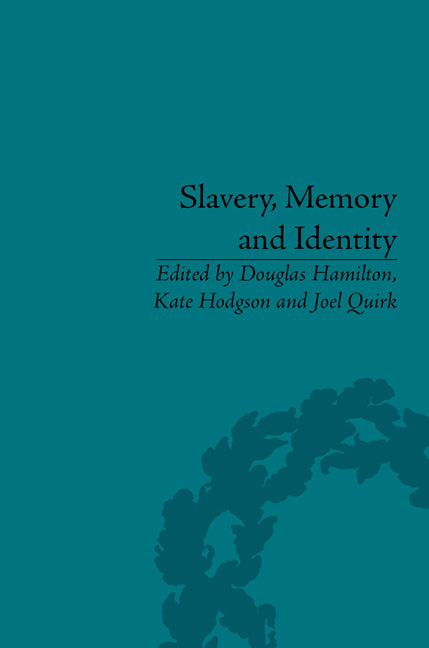Book contents
- Frontmatter
- CONTENTS
- Acknowledgements
- List of Contributors
- Introduction: Slavery, Memory and Identity: National Representations and Global Legacies
- 1 ‘A Thoroughly National Work’: The Politics of Blame and European Abolitionist Identities
- 2 From Slave Quarters to Wigwams: Native American Slaveholding and the Debate over Civilization
- 3 For Civilization's Sake: Legal Abolition of Slavery in Nepal and Sierra Leone in a Global Perspective, 1920–30
- 4 The Heritage of Slavery and Nation Building: A Comparison of South Africa and Mauritius
- 5 Picturing Slavery: The Perils and Promise of Representations of Slavery in the United States, the Bahamas and England
- 6 ‘History Must be Re-Written!’: Revisionist Ambitions among West African Slave Descendants
- 7 Contrapuntal Memories of Slavery and Abolition in the French-Speaking World
- 8 Public Memory of Slavery in Brazil
- 9 Learning to Remember and Imagine Slavery: The Pedagogies of Museum Field Trips in the Representation of ‘Difficult’ Histories
- 10 Slavery and Racism as the ‘Wrongs’ of (European) History: Reflections from a Study on Portuguese Textbooks
- Notes
- Index
8 - Public Memory of Slavery in Brazil
- Frontmatter
- CONTENTS
- Acknowledgements
- List of Contributors
- Introduction: Slavery, Memory and Identity: National Representations and Global Legacies
- 1 ‘A Thoroughly National Work’: The Politics of Blame and European Abolitionist Identities
- 2 From Slave Quarters to Wigwams: Native American Slaveholding and the Debate over Civilization
- 3 For Civilization's Sake: Legal Abolition of Slavery in Nepal and Sierra Leone in a Global Perspective, 1920–30
- 4 The Heritage of Slavery and Nation Building: A Comparison of South Africa and Mauritius
- 5 Picturing Slavery: The Perils and Promise of Representations of Slavery in the United States, the Bahamas and England
- 6 ‘History Must be Re-Written!’: Revisionist Ambitions among West African Slave Descendants
- 7 Contrapuntal Memories of Slavery and Abolition in the French-Speaking World
- 8 Public Memory of Slavery in Brazil
- 9 Learning to Remember and Imagine Slavery: The Pedagogies of Museum Field Trips in the Representation of ‘Difficult’ Histories
- 10 Slavery and Racism as the ‘Wrongs’ of (European) History: Reflections from a Study on Portuguese Textbooks
- Notes
- Index
Summary
During the period of the Atlantic slave trade, Brazil imported more than five million enslaved Africans, the largest number of all the Americas. In 1888, Brazil was also the last country in the American continent to abolish slavery. Since the end of slavery, the majority of the descendants of Africans deported to Brazil remained economically and socially excluded. In the last thirty years, however, the denunciation of social and racial inequalities and the fight against racism have significantly increased. The growing visibility of Afro-Brazilian demands for civil rights have led to the development of different forms of cultural assertion, in which Africa occupies the central place.
In Brazil, as in the rest of the Americas, Europe and Africa, emerging initiatives highlighting the memory of slavery in public space have largely resulted from the political struggle of actors seeking social justice. Through Carnival, dance, music, visual arts and religion, Afro-Brazilian groups have promoted the connections between Brazil and Africa. However, even in state capitals with large populations of African descent, such as Salvador and Rio de Janeiro, the Brazilian slave past has remained concealed in the public space. Although the politics and memory of slavery have been increasingly visible in the international arena since at least the early 1990s, Brazilian initiatives commemorating and memorializing slavery in the public arena have been comparatively recent. By examining the existing monuments and museums commemorating slavery in Brazil, this chapter contends that there have been considerable obstacles in creating permanent places dedicated to the public memory of slavery in the country. First, the absence of monuments and museums dedicated to slavery indicates how difficult it has been for the nation to deal with its slave past, as most individuals of African descent, which today constitute more than 50 per cent of the total Brazilian population, still occupy the lower ranks of Brazilian society. On the other hand, Afro-Brazilians do not wish to be constantly associated with a negative image of victimhood, embodying the tragedy experienced by their African ancestors.
- Type
- Chapter
- Information
- Slavery, Memory and IdentityNational Representations and Global Legacies, pp. 115 - 130Publisher: Pickering & ChattoFirst published in: 2014



